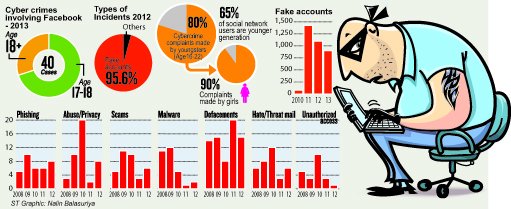News
Know your enemy – it’s not Facebook, it’s you
Facebook is not the enemy, said Manoj Jinadasa, senior lecturer at the Department of Mass Communication in the University of Kelaniya.
Lack of computer literacy, communication and breakage in family relationships were the real causes for the current surge in new  media-related tragedies.
media-related tragedies.
“New media is a tool in modern society and should be treated as such,” he said.
Sri Lanka had not been ready for the accelerated spread of new media usage over the past five years, said Mr. Jinadasa. This had triggered a heightened number of psychological issues.
According to research carried out by Mr. Jinadasa the most vulnerable users of social media are teenagers followed by young adults aged 20- 25 years.
“Most teenagers now lack a proper social life: their lives are focused on exams. There is hardly any communication in their relationships. These individuals are further isolated as the new media interactions are one-on-one,” said Mr. Jinadasa.
Lack of awareness about personal security on cyber platforms was the cause for many new media-related problems, says Roshan Chandraguptha, Information Security Engineer at Sri Lanka Computer Emergency Response Team.
“Out of all incidents reported last year the majority of the incidents were related to security on the internet,” Mr. Chandraguptha said.
“Users should understand that they should be careful about sharing their personal information just like in normal day-to-day social interactions where we do not share personal information with strangers,” he said.
Dinithi Jaysekara, lecturer at the University of Kelaniya pointed out most of the respondents in a research she conducted publicly displayed personal information and a large percentage of users publicly listed their mobile number and e-mail address.
The research was conducted among university students, who have higher computer literacy.
“This research shows they are not much concerned about safeguarding their privacy on Facebook,” she said highlighting the need for awareness.
“In Western countries media literacy is built into the school curriculum. This should be done here too,” said Mr. Jinadasa.
“Students from a young age should be taught how to productively engage in new media. At the same time, personality development should be looked into if we are to prevent the kind of psychological problems that are arising in teenagers engaging in new media.”


